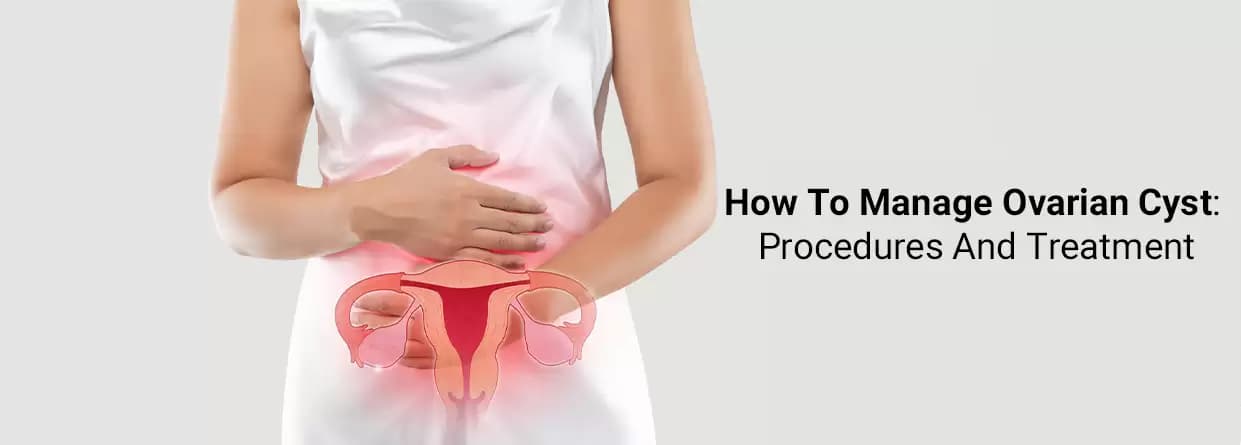
This blog contains information about different ways to manage and treat ovarian cysts. However, please note that this blog is for informational purposes only and does not replace the significance of a doctor’s consultation. Read along to know more about ovarian cysts and how you can manage the symptoms.
Ovarian cyst refers to semisolid or fluid-filled pockets which are benign. While most symptoms tend to remain silent and usually go away on their own, prolonging the condition can also result in life-long complications. In India and across the globe, many women are prone to ovarian cysts, especially when they are young and ovulating. Therefore, treatment becomes important to avoid complications including ovarian cancer.
This blog contains information about different ways to manage and treat ovarian cysts. However, please note that this blog is for informational purposes only and does not replace the significance of a doctor’s consultation. Read along to know more about ovarian cysts and how you can manage the symptoms. You can also consult the gynecologist in Kolkata to learn more about ovarian cysts.
There are different types of ovarian cysts which can vary in size (can be as small as a pea to as big as the size of a large melon). Here are some common types of ovarian cysts -
Ovarian cyst symptoms can come and go depending on the type and size of the cyst. You can get in touch with the doctor in case you are experiencing sudden or severe abdominal pain, fever, vomiting, and signs of shock (cold, clammy skin, rapid breathing).
Ovarian cyst treatment depends on factors like age, the severity of symptoms, and the primary cause of the cyst. Usually, in case of mild to moderate symptoms, the doctor recommends watchful waiting to observe the progression of the condition. Follow-up consultations within a few weeks or months can reduce the chances of complications.
The doctor may also prescribe hormone medications to stop ovulation and prevent the condition from getting worse. Medicines such as birth control pills can keep you from ovulating and keep you from getting more cysts. However, medications do not shrink the existing cysts. For that, the doctor recommends surgery.
The type of surgery depends on the size of the cyst. The surgeon may perform different procedures such as laparoscopy which involves a keyhole incision in the abdomen. A device fitted with a small camera on the other end is inserted to gain access to the reproductive organs. Subsequently, the surgeon removes the cysts through the tiny incisions.
Another surgical procedure is known as laparotomy which is performed on a very large cyst or during a complication. The surgeon may choose to remove ovaries (cystectomy), uterus, cervix, and fallopian tubes if there is a probability of turning into cancer.
In most cases, ovarian cysts are successfully treated depending on the recovery time of the patient. However, doctors often recommend follow-up sessions to reduce the chances of recurrence. It is also important to follow the doctor’s advice and take regular medications for a smooth and quick recovery. Furthermore, lifestyle changes and dietary restrictions are also important in managing the disease for long-term health benefits.
What are the causes of ovarian cysts?
Ovarian cysts are caused due to the following -
What do ovarian cysts feel like?
While the symptoms vary in women, you are likely to feel -
Does an ovarian cyst cause weight gain?
Yes, some cysts secrete hormones which can cause bloating. This can eventually lead to weight gain in many women.
What are the complications of ovarian cysts?
If you choose to undergo treatment for ovarian cyst removal, you may suffer from the following conditions -
Written and Verified by:

Dr. Manas Kundu is a Consultant in Obstetrics & Gynaecology Dept. at CMRI, Kolkata with over 28 years of experience.
He specializes in laparoscopic gynaecological surgery, pregnancy hypertension, infertility (IVF & ICSI), and obstetric & gynaecological ultrasonography including transvaginal sonography.
Similar Obstetrics and Gynaecology Blogs
Book Your Appointment TODAY
© 2024 CMRI Kolkata. All Rights Reserved.